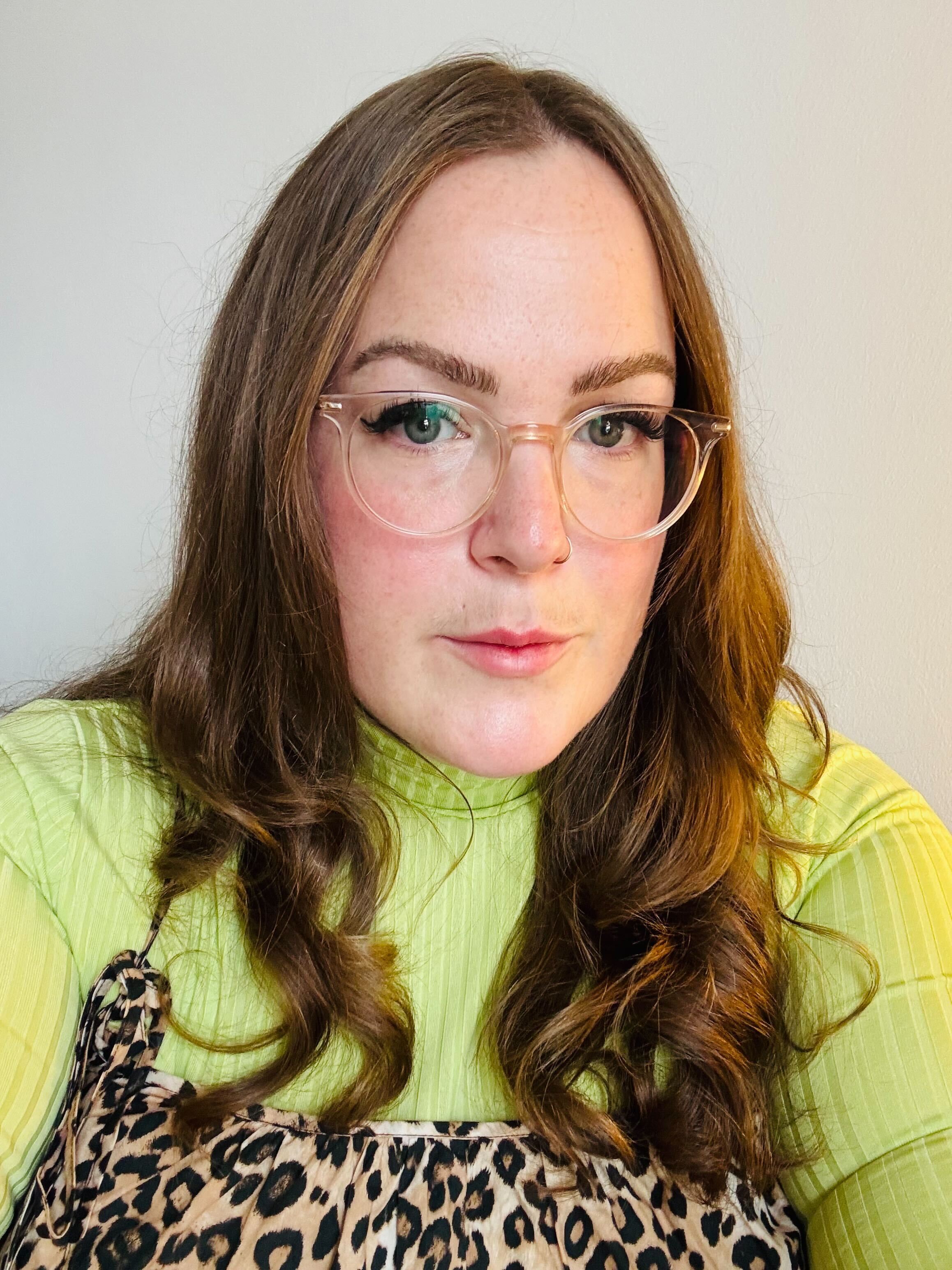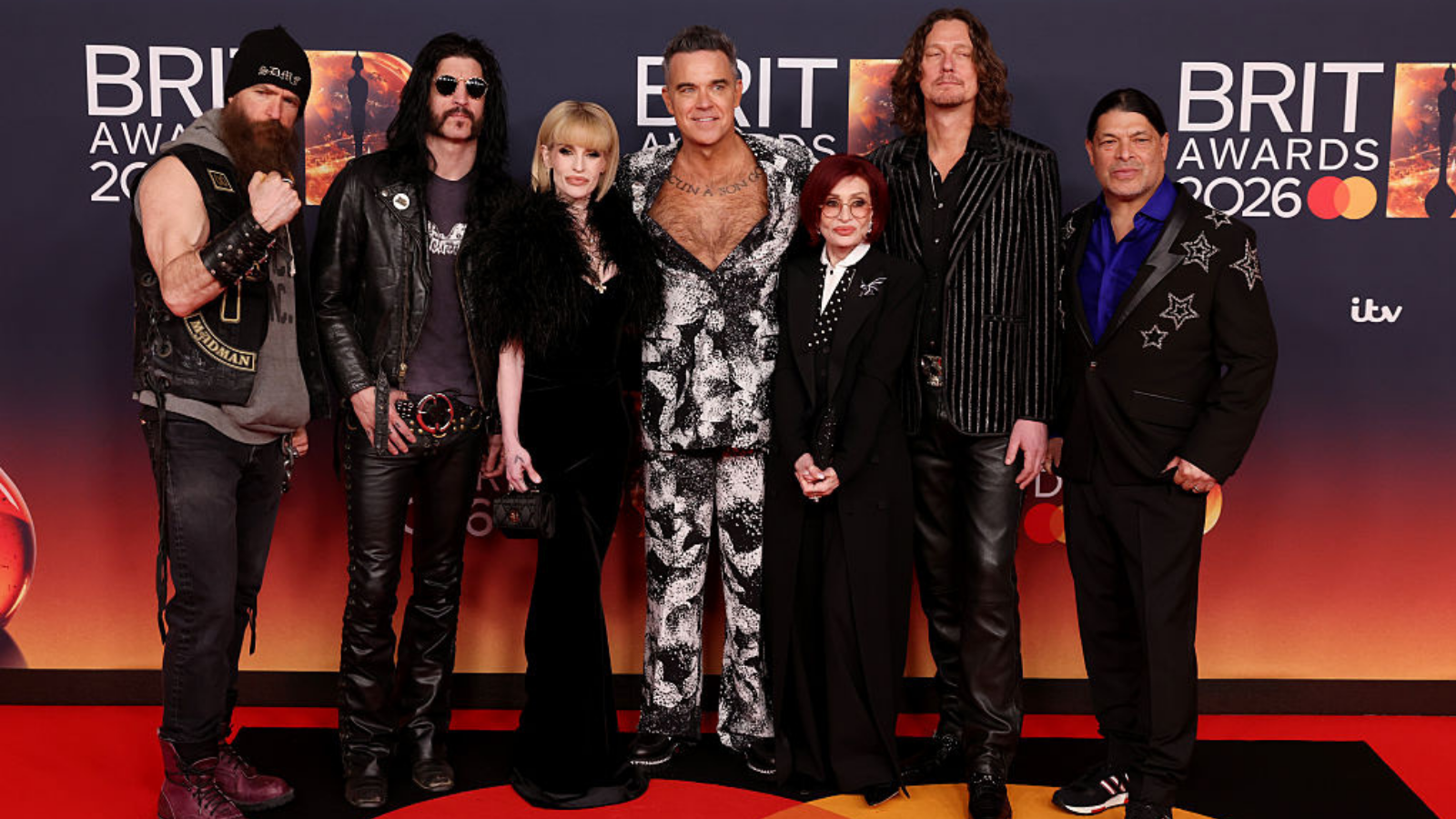The 15 best Elton John songs
Elton John songs run the gamut from glam rock to upbeat pop and almost everything in between – here we celebrate 15 of the best
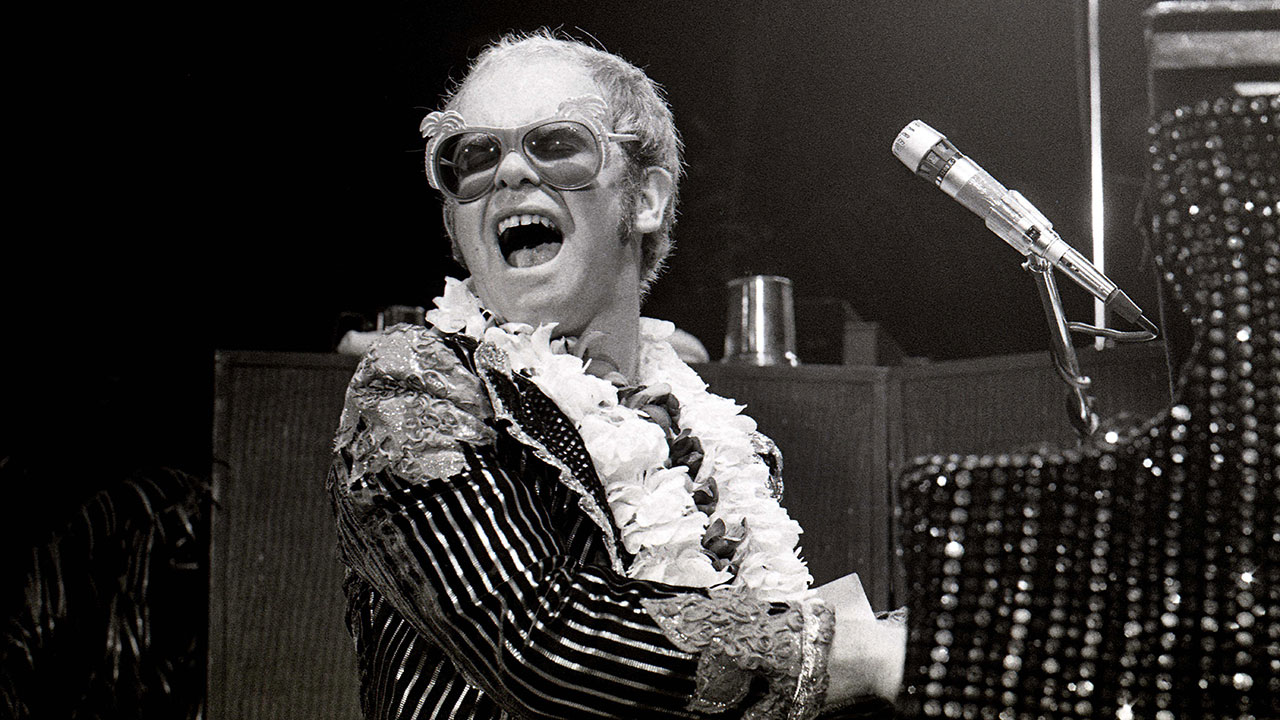
Select the newsletters you’d like to receive. Then, add your email to sign up.
You are now subscribed
Your newsletter sign-up was successful
Want to add more newsletters?
There are a lot of Elton John songs. By our calculations, there's at least 200 of them. It's a staggering number, but one which should be expected when you consider that John is one of the most important – and prolific – artists the UK has ever produced.
Among those 200 songs lie some of the most interesting and invigorating work in rock'n'roll history. Alongside his long-term songwriting partner, Bernie Taupin, and resident producer Gus Dudgeon, John produced music which both marked him out from his contemporaries and pushed boundaries for what it meant to be a real rockstar in the 1970s.
There's a scene in new biopic Rocketman which pulls John's talent into sharp perspective. Sitting down in front of a piano in his mother's poky front room, the opening bars of eventual mega-hit Your Song flow from his fingertips in a flush of easy inspiration. Given that the real song was allegedly written in minutes, it's an account which doesn't seem too far from the truth.
Of course, with a back catalogue so vast, not everything could make the cut. John's biggest hit, Candle In The Wind, has been omitted here thanks to the years of cloying overfamiliarity which have rendered it, frankly, one of those songs you never need to hear again.
Instead, we pick out the 15 best, most original and dynamic Elton John songs, and celebrate a back catalogue which has come to define British music.

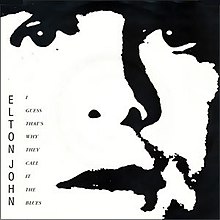
15. I Guess That’s Why They Call It The Blues (Too Low For Zero, 1983)
Home to one of the most recognisable choruses in John's back catalogue – which really is no mean feat – this plaintive doo-wop power ballad tells the story of two lovers ripped apart by war. Laced with casual regret and mournful longing, the lyrics were written by John's writing partner Bernie Taupin in tribute to his second wife, Toni Russo.
It would become one of John's biggest hits during the 80s, no doubt helped by the fact the song features Stevie Wonder on harmonica.
Sign up below to get the latest from Classic Rock, plus exclusive special offers, direct to your inbox!
"Bernie was back on Too Low for Zero – we wrote everything on the album," John told Rolling Stone of the song in 2013. "Also, it was the first time I met Renate [Blauel, later to be John's first wife], because she was an engineer on that record.
"It really was a return to form. Even though I'm Still Standing was kind of an anthem, ...Blues is the one for me because it's just a great song to sing. It's timeless."
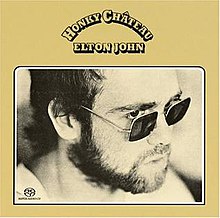
14. Mona Lisas And Mad Hatters (Honky Château, 1972)
Taken from the first Elton record to hit number one in the US, this track showed what the singer was capable of as he scaled the heights of his brilliant Early Period – before his fascination with ostentatious glasses threatened to overshadow his talent.
Inspired by Taupin's first visit to New York – where he discovered a less salubrious city than he'd expected – it's an unusually direct lyric from the writer which could equally be interpreted as a metaphor for facing reality with the people you really care about while the spectacle of your dreams crumbles around you.
"This song is about our first impressions of New York City in 1970, and if anybody was around in that period of time they'll realise that New York wasn't quite as magical as it was probably presented to the rest of the world," Taupin told CBC in 2018. "It was a tough place to get along in and we didn't have a lot of money back then, but it had a profound effect on me.
"I remember New York as being always cold when we were there. I found refuge in museums and art galleries and any place I could get in that didn't cost any money that would give me some sort of inspiration. But it was a tough place and all the magical things you hear about it sort of were contradicted by other things that were happening on the street."
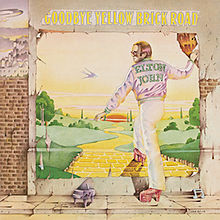
13. Grey Seal (Goodbye Yellow Brick Road, 1973)
Goodbye Yellow Brick Road is arguably the gleaming apex of John's recording career, and this relative deep cut is one of the album's very best.
Originally released as a B-side to Rock And Roll Madonna but dusted off and polished up for GYBR, this song is allegedly one of Elton's favourites – and one he dubbed "Procol Harum-ish absurd, like a Dali painting." The track is a brilliant showcase for Elton's knack for a sweet harmony and storming chorus.
With a lyric written by Taupin, Elton fans have long dissected the song's surreal words searching for a deeper meaning – though it's likely they'll be looking a long time, as Taupin himself has admitted he “hadn’t a clue what [he] was writing about”.
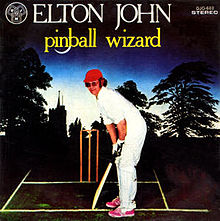
12. Pinball Wizard (Tommy Soundtrack, 1975)
Okay, okay, we know – if we're splitting hairs, this isn't technically an Elton John song. Written by The Who for their 1969 rock opera Tommy, Elton's version came to life when he tackled it for the album's 1975 film adaptation. Similar but distinct, John's version replaced The Who guitarist Pete Townshend's acoustic guitar licks with piano and gave the original a glam rock stomp.
John's version became such a hit upon its release as a single that it became the first and only The Who cover to ever break the top 10, and John's first appearance in the top 10 since another of his covers, The Beatles' Lucy In The Sky With Diamonds, a year earlier. It's now well known as an enduring part of his oeuvre and live set, so for our money, it counts.
“Elton arrived at the Battersea studio in a Phantom 5 limousine,” Pete Townshend wrote of the cover's inception in his Who I Am autobiography. “Similar to the one used by the Queen; I hadn’t seen one in the rock world since Andrew Oldham’s in 1967.
"It was a revelation to observe how quickly and efficiently Elton and his band worked, nailing a driving track with solos, lead and backing vocals in less than four hours."
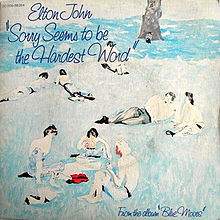
11. Sorry Seems To Be The Hardest Word (Blue Moves, 1976)
Another of John and Taupin's unashamedly mournful love songs, this Blue Moves single marks something of an anomaly for the songwriting duo. “The interesting thing about Sorry Seems To Be The Hardest Word is that it’s one of the rare occasions when Elton played me a melody line that inspired a lyric, as opposed to our routine of the lyrics always coming first," Taupin says of the song.
"He was messing around on the piano one day and was playing something and asked me what did I think. It was actually pretty immediate, the title and the first couple of lines came into my head in a way that I guess I felt they were already there and just needed a little prompting.
Lyrically, the song cuts pretty deep: "It’s a pretty simple idea, but one that I think everyone can relate to at one point or another in their life," says Taupin. "That whole idealistic feeling people get when they want to save something from dying when they basically know deep down inside that it’s already dead.
"It’s that heartbreaking, sickening part of love that you wouldn’t wish on anyone if you didn’t know that it’s inevitable that they’re going to experience it one day."
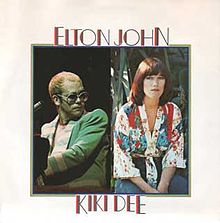
10. Don’t Go Breaking My Heart (Single, 1976)
A gleeful tribute to the Motown sounds which dominated the charts in the 60s, this Kiki Dee duet netted John and Taupin an Ivor Novello award in 1976.
Mischievously written by John and Taupin under pseudonyms John had previously devised for them – Ann Orson, a mash-up of the phrase “A horse and cart” and Carte Blanche, the name of a prestigious credit card at the time respectively – the song is another rarity which saw the lyrics written around tune John simply couldn't get out of his head.
“Elton didn’t have a lyric for it," remembers Producer Gus Dudgeon. "It was so weird to see him writing a song in the studio with no lyric. I’d never seen him do it before. And all he was singing was ‘Don’t go breaking my heart. Don’t go breaking my heart. Don’t go breaking my heart. Don’t go breaking my heart. Don’t go breaking my heart…’ That’s what he sang all the way through!”
The song marked great success for John in the 70s, climbing to number one in the UK charts and staying there for a month and a half. Since then, John has recorded alternative versions with, er, Miss Piggy, Minnie Mouse, and RuPaul among others.
“I remember hearing it on the radio for the first time and thinking, ‘Wow.’" says Dee. "‘Cos some records, especially in those days, they have to sound great on the radio…and this was one of those records that did. I remember thinking, ‘Oh, this could do okay. This could go.’”
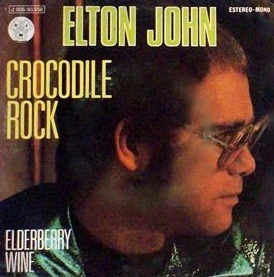
9. Crocodile Rock (Don't Shoot Me I'm Only The Piano Player, 1972)
One of John's most memorable singles – stolen, he later admitted, from Pat Boone’s 1962 hit Speedy Gonzales – this retro rock'n'roll throwback written about a fictional 50s dance craze was John's first single to reach the number one spot in the US. It topped the Billboard Hot 100 for three weeks in 1973 and spent a total of 14 weeks in the Top 40 – the longest any Elton single had managed at that point.
Sadly, the song wasn't as big a hit with its creators. “[Crocodile Rock is a strange dichotomy because I don't mind having created it, but it's not something I would listen to,” Taupin told Esquire in 2011 – while John went one better, describing the song as “disposable pop.”
"This time I wanted to do something that was a send-up of the early '60s rather than an out-and-out rocker," John told Beat Instrumental. "I wanted it to be a tribute to all those people I used to go and see as a kid. That's why I used the Del Shannon-type vocals and that bit from Pat Boone's Speedy Gonzales."
"We also tried to get the worst organ sound possible... something like Johnny and The Hurricanes used to manage to produce. This type of song is actually a very hard thing to write because the temptation is to try too hard and go berserk."
"My career wasn't about Crocodile Rock – it was just a one-off thing – but it became a huge hit record, and in the long run, it became a negative for me, because people said, 'Oh, fucking Crocodile Rock'", John told Rolling Stone. "I'd never started off as a hit writer, and I didn't know what a hit was, and it's evidenced on my first four albums. Rolling Stone reviewed it and gave it two stars, and I said, "Oh, fuck off." It was a great fucking pop record. Shut the fuck up."
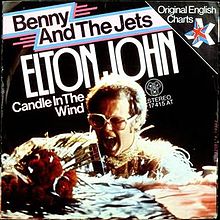
8. Bennie And The Jets (Goodbye Yellow Brick Road, 1973)
A song which has caused grief for sub-editors across the globe thanks to its title's interchangeable spelling conventions, this loose rock'n'roll number also traded heavily on R&B conventions. Thanks to this, WJLB, Detroit's number one black station, would begin playing Bennie... experimentally as an album cut, opening John up to a whole new audience and netting him a spot in the R&B charts in the process.
The song's protagonist, Bennie, was dreamt up by John as a "sci-fi rock goddess," with Taupin telling Esquire that "Bennie And The Jets was almost Orwellian – it was supposed to be futuristic. They were supposed to be a prototypical female rock 'n' roll band out of science fiction. Automatons.
"I'd always had this wacky science fiction idea about a futuristic rock and roll band of androids fronted by some androgynous kind of Helmut Newton style beauty, which was depicted to little great effect on the Yellow Brick Road album cover.
"I'm not sure if it came to me in a dream or was some way the subconscious of effect of watching Kubrick on drugs. Either way, it was definitely something that was totally formed as a concept, and something that could have morphed into any number of populist items. Could have been comic books or movies. In fact, I can't help but believe that that Robert Palmer video with all the identical models somehow paid a little lip service to The Jets."
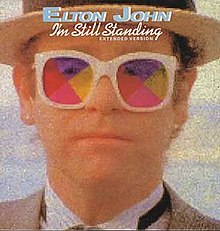
7. I’m Still Standing (Too Low For Zero, 1983)
Said by John to be his "reaction to still being relevant and successful in the early 1980s," having successfully swerved the post-punk and new romantic trends which had swallowed up the charts, this triumphant, high-energy workout held two fingers firmly aloft to the naysayers who'd speculated his career was over. Such was its enduring popularity that in 1991 a USA Today survey found it to be the favourite song of America’s Marine pilots.
“It’s perhaps one more example of the original idea being interpreted by everyone into something quite different," said Taupin of the song's lyrics. "I think people see it as an anthem based on Elton’s strong sense of survival in the face of adversity.
"Which, believe me, is perfectly fine by me – and in fact it’s probably infinitely more interesting than what it was originally written about. Which, if my memory serves me correctly, was a sort of kiss-off to an old girlfriend. You know the sort of thing: ‘Don’t you worry about me, I’ll be perfectly fine.’ Unlike George Jones’ She Thinks I Still Care, where in fact he really did… I really didn’t.”
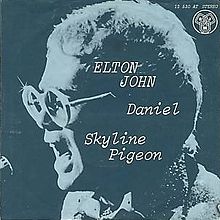
6. Daniel (Don't Shoot Me I'm Only The Piano Player, 1972)
Desribed by John as "a calypso-type number with Everley Brothers-type harmonies," this '72 hit both won John and Taupin an Ivor Novello and provided fashion designer Donatella Versace with the name of her son.
A soft, warm ballad, its musical tone belies the subject matter: the tale of a wounded Vietnam veteran who returns from war and finds himself unable to escape the glare of the public.
"I'd seen this article in Time magazine on the Tet Offensive," says Taupin. "And there was a sidebar next to it with a story about how many of the soldiers that were coming back from 'Nam were these simple sort of down home country guys who were generally embarrassed by both the adulation and, depending on what part of the country you came from, the animosity that they were greeted by.
"For the most part, they just wanted to get back to a normal life, but found it hard, what with all the looky loos and the monkeys of war that they carried on their backs.
"I just took it from there and wrote it from a younger brother's perspective; made him disabled and wanting to get away. I made it Spain, basically, because it rhymes with plane."
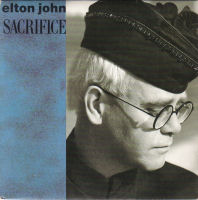
5. Sacrifice (Sleeping With The Past, 1989)
John's first solo number one single in the UK, this track was also awarded an Ivor Novello for becoming the best-selling A-side of 1991 – despite the fact the song all but tanked when it was originally released in 1989. Had it not been for radio DJ Steve Wright, who began replaying it on his BBC Radio One afternoon show, John would never have decided to re-release it in 1990, and Sacrifice may well have been resigned to history's bargain bin.
Picked out by Taupin as the best song he and John ever collaborated on, this firm fan-favourite has been performed by John almost 500 times live. A maudlin, heartfelt ballad with a lyric that concentrates on how difficult it is to stay faithful and devoted during a relationship – challenging the notion that successful relationships require 'sacrifice' – it's a frank, honest and moving account of modern love.
"It’s a simple lyric, but it’s an intelligent, adult lyric," said Taupin. "It’s basically about the rigours of adult love, and it’s a million miles away from Your Song.
"Elton came up with a brilliant melody, and his performance on it gives it a lot of integrity and meaning."
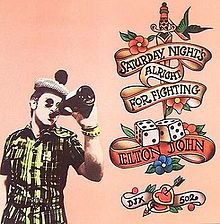
4. Saturday Night’s Alright For Fighting (Goodbye Yellow Brick Road, 1973)
This stomping glam rock powerhouse has been a staple of John's set since its release, and is easily one of John's most critically and commercially successful tracks. One of John's most covered songs, versions have been recorded by W.A.S.P., Nickelback, Queen, Fall Out Boy and many more.
“I vividly remember recording Saturday Night’s Alright For Fighting," John told Rolling Stone. "I couldn’t seem to get the piano part right, so when the band played bass, drums and guitar, I laid on the floor did the vocal live. And then I put on my piano part afterwards.
"It’s an odd way of doing it. But I remember doing that because it felt, for some reason, the four of us, me playing live, it just didn’t work. So I overdubbed my piano afterwards and sang the vocal live."
“Over the years you tend to invent your own myths about songs because you feel it’s necessary to come up with a reason why you wrote a certain song," added Bernie. "It’s been said on so many occasions that Saturday Night’s Alright For Fighting relates to my English past.
"People says, ‘Oh, Bernie wrote it about a pub he used to hang out and get into fights at.’ It’s quite possible there’s a germ of truth in that. Did I say to myself, ‘I’m going to sit down and write a song about my childhood watching the mods fight the rockers?’ No, I don’t think that I did. With so many of my songs, the lyrical content has been misconstrued, misinterpreted and you get to the point where you feel like you have to make something up in order to make somebody happy.”
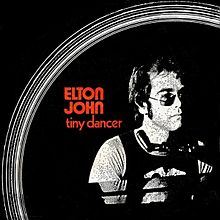
3. Tiny Dancer (Madman Across The Water, 1972)
Given a new lease of life when its popularity was boosted by its inclusion in the 2000 film Almost Famous, this delicate, goosebump-inducing ballad failed to break the charts upon its release in 1972, but has become one of John's defining tracks since.
Home to one of the most recognisable piano riffs ever written, Tiny Dancer spins a touching tale of dreamy, carefree love and yearning which would spark joy and warmth in even the coldest of hearts.
“We came to California in the fall of 1970 and it seemed like sunshine just radiated from the populace,” Taupin says. “I guess I was trying to capture the spirit of that time, encapsulated by the women we met, especially at the clothes stores and restaurants and bars all up and down the Sunset Strip. They were these free spirits, sexy, all hip-huggers and lacy blouses, very ethereal the way they moved.”
“They were just so different from what I’d been used to in England. They had this thing about embroidering your clothes. They wanted to sew patches on your jeans. They mothered you and slept with you. It was the perfect Oedipal complex.”
"Tiny Dancer is a complex song – it's not easy to sing – but the album did brilliantly," John said of the song.
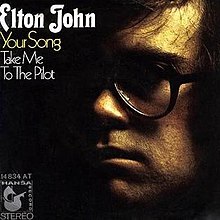
2. Your Song (Elton John, 1970)
"What can I say, it's a perfect song – it gets better every time I sing it," John told Rolling Stone of Your Song in 2013, which might go some way to explaining why it's had a jaw-dropping 2028 live outings since John first wrote it in 1970, making it his most-played live song ever. It may also explain why it was recently voted the UK's favourite Elton John song of them all.
With its lazy piano and unassuming acoustic strums, Your Song has become a standard not just in Elton's back catalogue, but for British music as a whole. “I remember hearing Elton John's Your Song, heard it in America – it was one of Elton's first big hits," John Lennon said of the track in 1975. "And I remember thinking, 'Great, that's the first new thing that's happened since we happened.' It was a step forward. There was something about his vocals that was an improvement on all of the English vocals until then."
"I remember writing it at my parents' apartment in North London, and Bernie giving me the lyrics, sitting down at the piano and looking at it and going, 'Oh, my God, this is such a great lyric, I can't fuck this one up,'" said John. "It came out in about 20 minutes, and when I was done, I called him in and we both knew.
"I was 22, and he was 19, and it gave us so much confidence. Empty Sky was lovely, but it was very naive. We went on to do more esoteric stuff like Take Me To The Pilot, of course, but musically, this was a big step forward. And the older I get, the more I sing these lyrics, and the more they resonate with me."
“It’s the voice of someone who hasn’t experienced love in any way," Taupin – who was only 17 when he wrote the lyrics – said of the song. "It’s a very virginal song.
"It has one of the most naïve and childish lyrics in the entire repertoire of music, but I think the reason it still stands up is because it was real at the time.”
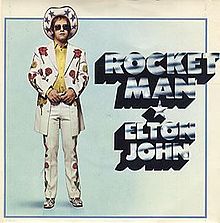
1. Rocket Man (Honky Château, 1972)
Rocket Man combines all the elements that made Elton John such a singular talent in the 70s: a soaring chorus, plaintive piano riff and stunning vocal turn. As such, it's little wonder that it's become the definitive Elton John track over the years. Light but textured, defiantly acoustic but with emotional heft, it's also the perfect example of what John, Taupin and Dudgeon could achieve as a trio.
Inspired by Ray Bradbury's 1951 short story The Rocket Man, which tells the tale of an astronaut torn between heading out on a mission to space and staying on Earth with his family, John's song was written at a time when excitement around space exploration was reaching fever pitch, dominating popular culture and media.
But many have speculated that the lyric also serves as a metaphor for the way fame can isolate people from their friends, family and from the real world – a theme incidentally explored in the Rocketman biopic.
"I remember buying this when it came out as a single by Elton John," Kate Bush told the NME of the track. "I couldn't stop playing it – I loved it so much. Most artists in the mid seventies played guitar but Elton played piano and I dreamed of being able to play like him."
"The first huge single that I had," John told Rolling Stone. "Your Song was a hit; Rocket Man was a big hit. It had an acoustic guitar on it, it was a different song for me – it was a simpler sound.
"I'd moved into a house, I was becoming successful, I was so confident, musically. Everything was to do with the music – touring, recording, radio interviews, photo shoots and 'What are we going to do next?'"
Briony is the Editor in Chief of Louder and is in charge of sorting out who and what you see covered on the site. She started working with Metal Hammer, Classic Rock and Prog magazines back in 2015 and has been writing about music and entertainment in many guises since 2009. Her favourite-ever interviewee is either Billy Corgan or Kim Deal. She is a big fan of cats, Husker Du and pizza.
